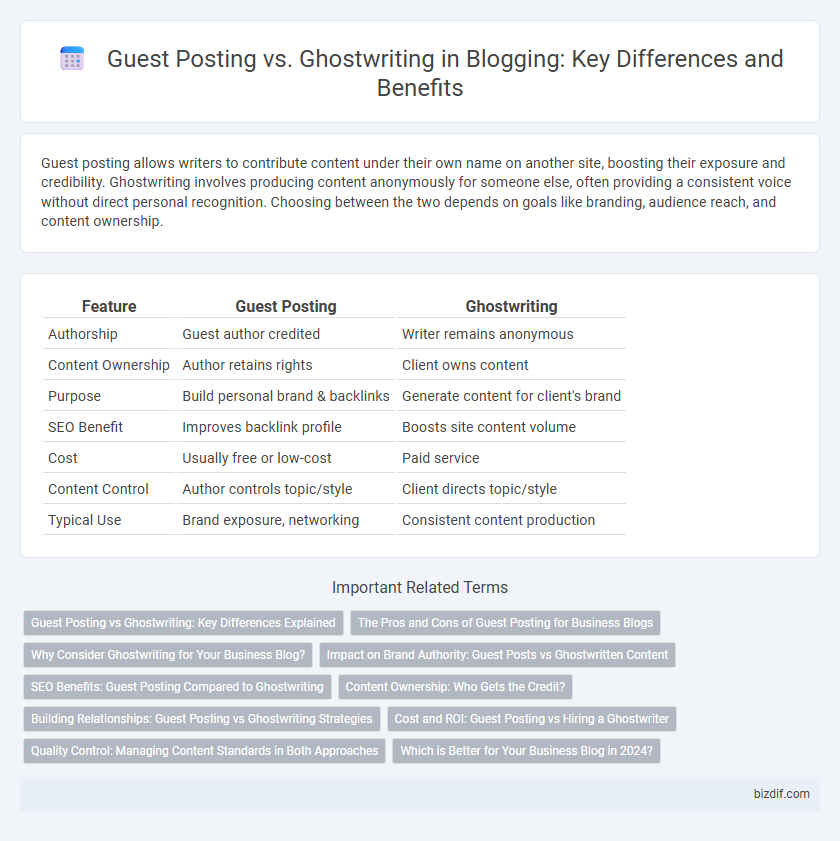Guest posting allows writers to contribute content under their own name on another site, boosting their exposure and credibility. Ghostwriting involves producing content anonymously for someone else, often providing a consistent voice without direct personal recognition. Choosing between the two depends on goals like branding, audience reach, and content ownership.
Table of Comparison
| Feature | Guest Posting | Ghostwriting |
|---|---|---|
| Authorship | Guest author credited | Writer remains anonymous |
| Content Ownership | Author retains rights | Client owns content |
| Purpose | Build personal brand & backlinks | Generate content for client's brand |
| SEO Benefit | Improves backlink profile | Boosts site content volume |
| Cost | Usually free or low-cost | Paid service |
| Content Control | Author controls topic/style | Client directs topic/style |
| Typical Use | Brand exposure, networking | Consistent content production |
Guest Posting vs Ghostwriting: Key Differences Explained
Guest posting involves contributing original content to another blog or website, enhancing the author's visibility and driving targeted traffic, while ghostwriting entails creating content on behalf of someone else who retains the authorship credit. Guest posting typically allows for author bio inclusion and link building, benefiting the guest author's SEO, whereas ghostwriting prioritizes the client's brand voice and confidentiality, often limiting public recognition. Understanding these distinctions helps marketers and writers choose the most effective content strategy to boost online presence and authority.
The Pros and Cons of Guest Posting for Business Blogs
Guest posting for business blogs enhances brand visibility and drives targeted traffic through authentic content from industry experts, fostering trust with new audiences. However, reliance on external contributors can lead to inconsistent content quality and potential misalignment with brand voice. Balancing guest posts with internal content ensures diverse perspectives while maintaining control over messaging and SEO performance.
Why Consider Ghostwriting for Your Business Blog?
Ghostwriting offers businesses the advantage of professionally crafted content that maintains brand voice consistency while saving time and resources. It enables companies to publish high-quality posts regularly without burdening internal teams, enhancing audience engagement and authority in their niche. Leveraging ghostwriters can also improve SEO performance by delivering optimized, relevant content tailored to target keywords and market trends.
Impact on Brand Authority: Guest Posts vs Ghostwritten Content
Guest posting allows brands to showcase expertise under their own name, directly enhancing brand authority and trustworthiness by engaging readers authentically. Ghostwritten content, while professionally crafted to align with a brand's voice, may lack the personal attribution that strengthens transparent credibility and audience connection. Choosing between these strategies depends on whether a brand prioritizes visible authorship or polished content consistency to build its authority.
SEO Benefits: Guest Posting Compared to Ghostwriting
Guest posting enhances SEO by generating high-quality backlinks from authoritative websites, boosting domain authority and search engine rankings. It also increases brand visibility and drives targeted referral traffic through exposure on relevant blogs. In contrast, ghostwriting primarily improves content quantity and quality on your own site but lacks the backlink and audience expansion advantages offered by guest posting.
Content Ownership: Who Gets the Credit?
Guest posting allows writers to retain credit for their work, often including bylines and backlinks that enhance their personal brand and SEO value. Ghostwriting transfers content ownership entirely to the client, with the writer remaining anonymous and receiving no public attribution. This fundamental difference impacts both the authorship recognition and long-term benefits from the published content in blogging.
Building Relationships: Guest Posting vs Ghostwriting Strategies
Guest posting fosters direct relationship building by allowing authors to showcase their expertise under their own name, increasing credibility and networking opportunities within the blogging community. Ghostwriting, while enhancing content output, limits personal brand visibility since the work is published under another's name, reducing chances for authentic connections. Successful blogging strategies prioritize guest posting to cultivate trust and long-term collaborations with influencers and readers.
Cost and ROI: Guest Posting vs Hiring a Ghostwriter
Guest posting typically incurs lower upfront costs, often requiring payment only for featured publication or pitch creation, while ghostwriting demands higher fees due to full content creation and exclusive ownership. Return on investment (ROI) for guest posting can be substantial through backlinks and audience exposure, driving organic traffic and domain authority. Hiring a ghostwriter delivers tailored, high-quality content that strengthens brand voice and long-term engagement, potentially yielding higher conversion rates despite the initial expenditure.
Quality Control: Managing Content Standards in Both Approaches
Guest posting and ghostwriting both require strict quality control to maintain content standards, but they differ in execution. Guest posts often involve collaborative editing to ensure the contributor's voice aligns with the host blog's style and guidelines, while ghostwriting demands rigorous oversight to produce polished content that matches the client's tone and expectations seamlessly. Effective content management tools and clear communication protocols are essential in both approaches to uphold consistency and high-quality output.
Which is Better for Your Business Blog in 2024?
Guest posting offers valuable backlinks and expands your reach by leveraging established audiences, boosting SEO and brand authority in 2024. Ghostwriting ensures consistent, high-quality content tailored to your voice, saving time and maintaining your blog's professional image. Choosing between guest posting and ghostwriting depends on whether your priority is audience growth through external connections or content control and efficiency.
Guest posting vs ghostwriting Infographic

 bizdif.com
bizdif.com